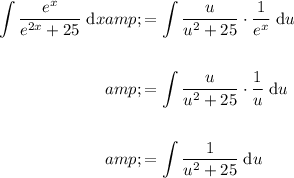Answer:

Explanation:
Given integral:

To integrate the given integral, we can use the method of substitution.

Differentiate u with respect to x:

Rearrange to isolate dx:

Rewrite the original integral in terms of u and du:

Rewrite 25 as 5²

We can now use the following integration rule to evaluate the integral:

In this case, a = 5 and x = u. Therefore:

Substitute back in
 :
:

Therefore, the evaluation of the given integral is:
